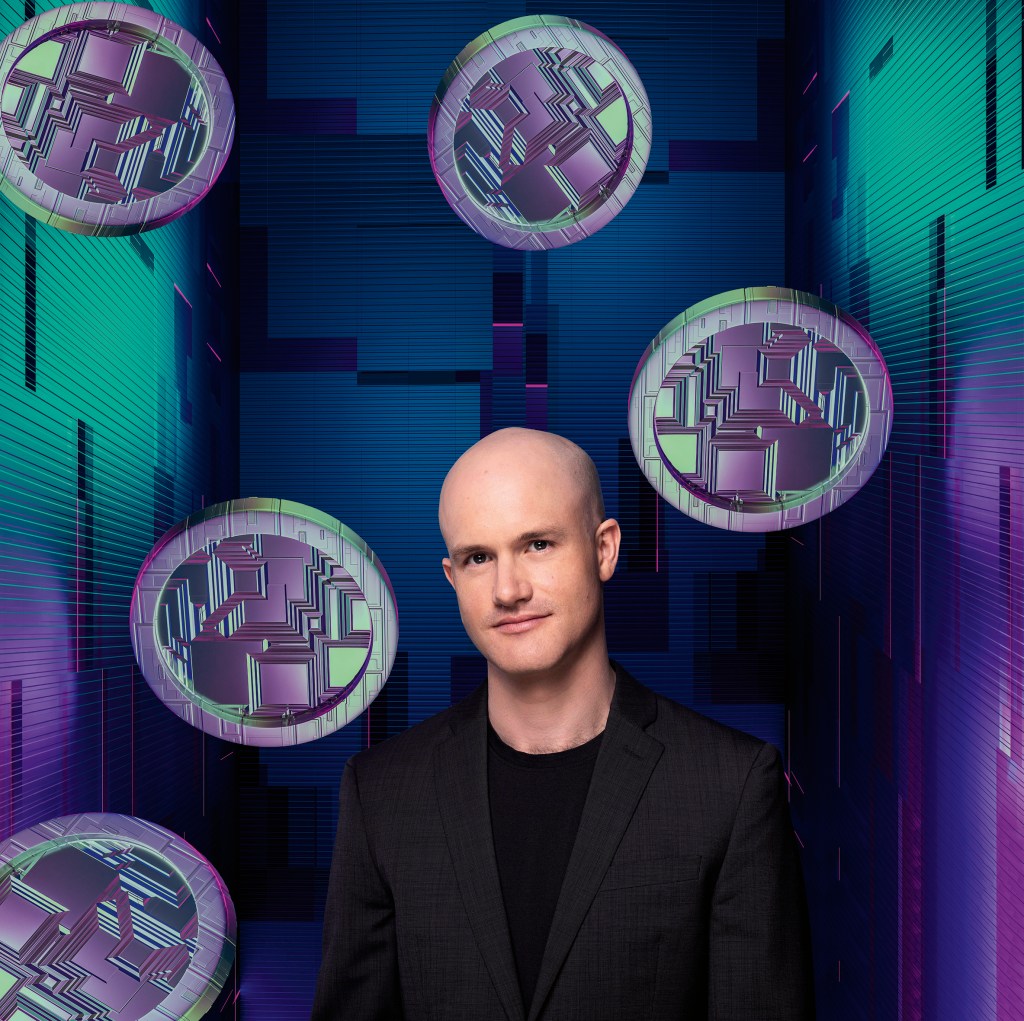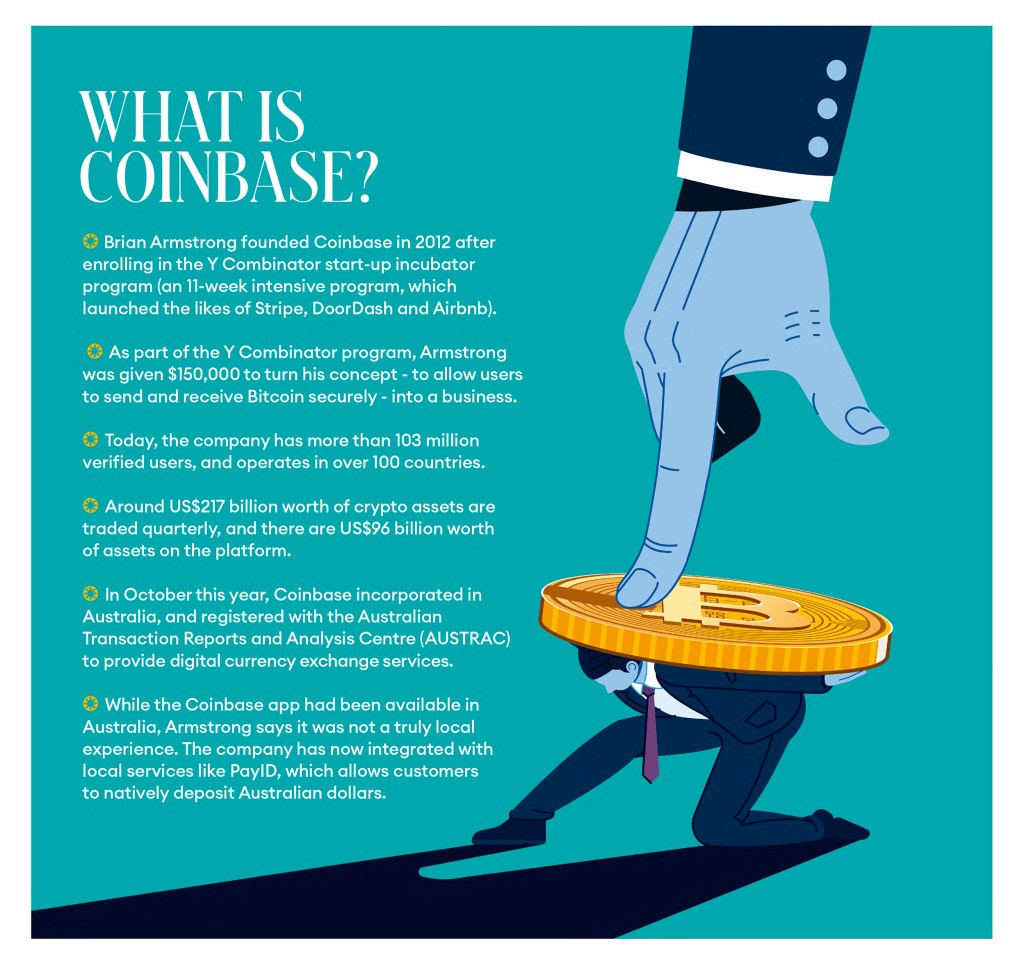Brian Armstrong is CEO and co-founder of Coinbase, the largest cryptocurrency exchange in the US. In the early days, he admits it was tricky to convince Silicon Valley that Bitcoin was a solid investment. More than 10 years later, he’s worth US$3.5 billion ($5.5 billion). He shares his journey with Forbes Australia.

You started Coinbase at a time when few people believed in Bitcoin. Did you ever think ‘I can’t do this’?
Building a startup… requires a combination of extreme resilience and determination because usually, any sane person would give up after two years of trying something if nothing is working. I mean, it’s not a rational thing to do.
But most startups, if you look at their origin, they usually had a period of a couple of years where they were just wandering in the desert lost, and nothing was really working. And so, a common trait amongst founders is determination and resilience. [Y Combinator founder] Paul Graham has written a couple of essays about why determination is the number one trait for founders – it’s even more important than being intelligent or being creative or being great at raising money or any of this stuff. It’s actually resilience and determination. Because the process is basically that every big breakthrough idea is a contrarian idea by definition. If it were already widely considered to be a good idea, somebody would already be doing it.
[German American entrepreneur] Peter Thiel has talked about this a lot too. A startup is an idea that looks like a bad idea, but it’s actually a good idea. It’s by definition contrarian, and you have to be willing to have 99% of people in the world think you’re crazy, but not actually be crazy.
You have to find something that’s true, that 99% of people believe is not true. It’s a fascinating thing. The industry you operate in is, by its nature, constantly changing.
How do you stay on top of trends?
There are private chat groups that are either groups of employees at Coinbase, or they’re external people on WhatsApp or these kinds of messaging apps. These private chat groups are where I get more and more of my information. Sometimes, we will share links to articles. I don’t go to some newspaper or something like that to read what’s going on. I go to these chat groups, and they’re sort of like curated groups of people around the world who are interested in or [are] experts on a certain topic, and I find that to be a higher signal [of trends]. It’s like private social media.
How do you prioritise what needs to be done for the day/week ahead?
Every morning when I wake up, there are a handful of things that I do, like exercise and whatnot. But one of the things I do is write down, if I were only going to get three things done today that move forward my goals for the company, what would they be. I think hard about that and write down those three things. Then I try to start my day with those three things, before I look at any emails or messages or have any meetings. And the reason is, of course, there are so many things coming at you. There are people trying to put things on your ‘to do’ list. If I don’t start the day doing the things on my ‘to do’ list to move the big goals forward, they often don’t get done. So that’s something that I’ve done for a long time.
What’s non-negotiable in your daily routine to ensure you’re productive and performing at your best?
When I was younger, I would sleep less, but I realised I was going to burn out if I kept doing that. I knew I had to have better health routines otherwise I was not going to last long-term. So, even though I’m busy, I almost always get seven-and-a-half, eight hours of sleep. I also take some time to stretch, meditate and exercise – usually all three.
Whenever I wake up in the morning, I’m not like a fully productive person. I’m groggy. Without doing breathing exercises or that kind of stuff, if I just went right into work, I feel like I would be grumpy and irritable and you know, not very productive.
What is your decision-making process?
Sometimes I have an instinct and I’m like, ‘Let’s go!’. I just bring it to the table. But often we use a decision-making framework internally at Coinbase called RAPID. There’s a handful of decision-making frameworks like this, they are all similar. The basic idea is that you choose in advance who is going to be the decider, and who’s going to be giving input. And then you try to push the decision-making in the work further down, because otherwise it always ends up being me – especially if [the work] is controversial. It’s important to push down decision-making and choose someone who is the decider. We also encourage people to disagree and commit. We do it all in writing. What that means is that you can disagree. But, if the decision maker decides to go in a different direction, you have to commit to try and make it a success.
Do you have a favourite book or podcast?
I don’t know about a favourite – there are lots that I like. There’s a book I’ve been reading recently called The Outsiders [by William N. Thorndike], about eight unconventional CEOs and how they did innovative things over time. That was a good book. I think the All-In podcast is quite good. That’s what I’ve been listening to recently.
Quote that you live by?
“The biggest risk is not taking one.”
Is there anyone you look up to in the business world?
Elon Musk.
Is there something you see business leaders repeatedly getting wrong? If so, how would you help them fix it?
Many companies have a lot of employee activism within the company. I think a lot of that comes from a good place, but it’s actually very harmful to the company in terms of creating internal division and distraction. We’ve pioneered something at Coinbase where we say, ‘We are here to focus on the mission’. If you have controversial, broader societal issues that are important to you, that you want to focus on outside of work, that’s fine. But don’t discuss politics and stuff like that inside the workplace. I think most CEOs get this wrong. They’re trying to create an environment where everybody is welcome, and can talk about anything and everything. But what it turns into in practice is people just pushing their own political agendas and fighting with their co-workers. I think more companies should be focused on the mission and be apolitical.
What is Coinbase?
Brian Armstrong founded Coinbase in 2012 after enrolling in the Y Combinator start-up incubator program (an 11-week intensive program, which launched the likes of Stripe, DoorDash and Airbnb).As part of the Y Combinator program, Armstrong was given $150,000 to turn his concept – to allow users to send and receive Bitcoin securely – into a business.
Today, the company has more than 103 million verified users, and operates in over 100 countries. Around US$217 billion worth of crypto assets are traded quarterly, and there are US$96 billion worth of assets on the platform. In October this year, Coinbase incorporated in Australia, and registered with the Australian Transaction Reports and Analysis Centre (AUSTRAC) to provide digital currency exchange services.
While the Coinbase app had been available in Australia, Armstrong says it was not a truly local experience. The company has now integrated with local services like PayID, which allows customers to natively deposit Australian dollars.
